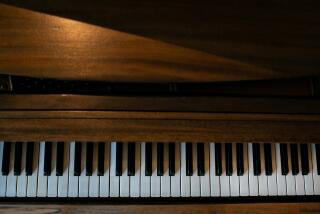Music to Their Ears
- Share via
“The Great Gatsby” composer John Harbison will have one key point to get across to his students during his residency this week at UC Irvine:
Make sure you like your work.
“It better be interesting and very fondly regarded by the person who makes it,” Harbison said from his home in Boston. “You’re the first person who has to be convinced by it.”
He has had students at the Massachusetts Institute of Technology, where he’s taught since 1984, who aren’t convinced.
“They turn in work saying, ‘I don’t really like it, but that’s what I did.’ Either they’re not telling the truth or they need to find a way to like it.”
As for other advice, he said he’ll abide by the Hippocratic oath. “I’ll try not to do any harm.”
Winner of a Pulitzer Prize (1987) and a MacArthur “genius” award (1989), Harbison, 61, was just selected as a UCI Chancellor’s Distinguished Fellow.
He’s been very much in the news since his opera, “The Great Gatsby,” based on F. Scott Fitzgerald’s 1925 novel, premiered in December. It had been commissioned by the Metropolitan Opera in New York to commemorate the 25th anniversary of its music director, James Levine.
A native of Orange, N.J., Harbison began composing at an early age, improvising on the piano by the time he was 5.
“I was always making up my own stuff rather than playing the pieces I was assigned. That’s what appealed to me.”
He formed a jazz band at 12 and remained torn between a career in jazz or one in classical music until a summer college break when he was studying at the Lenox (Mass.) School of Jazz.
Harbison “just didn’t understand” the music of Ornette Coleman and Don Cherry, he said.
“I didn’t want to be in jazz if I wasn’t going to be sympathetic to it.”
Harbison went on to finish his undergraduate work at Harvard University and then a master’s degree at Princeton. Besides teaching at MIT, he is composer-in-residence at the Aspen Music Festival. He has also been composer-in-residence with the Pittsburgh Symphony, the Los Angeles Philharmonic, the Tanglewood (Mass.), Marlboro (Vt.) and Santa Fe (N.M.) festivals, and the American Academy in Rome.
For his music, Harbison has one simple principle.
“I just try to keep myself guessing and, as much as possible, not take off from the same premise twice in a row.”
He writes down any musical idea that seems promising, then lets it alone to see if it has staying power or “tenacity.”
“I wait for the ideas to assert a character and to have a certain kind of physiognomy. Then you follow it until it runs out of energy. What I’m always hoping for in the end is something that sounds spontaneous.”
With “Gatsby,” for which he also wrote most of the libretto, Harbison treated each scene as a separate composition.
“That was the way to get through a very large structure,” he said.
Though Harbison believes this is a good time to be a composer, he’s wary of trying too hard to be popular.
“Take Heinrich Schutz. He doesn’t have what we call the popular touch. But he’s a perfect example of a composer we’re glad to have.”
Harbison puts his music in the middle of the popularity scale.
“There are pieces which my publisher would call a hard sell, but not for dogmatic reasons,” he said.
“But I really think that has very little to do with a composer’s intentions, and everything to do with his chemistry and instincts.”
Harbison points to the way Bach was received during his most creative phase, his late period.
“He was perceived as retrograde and old hat. That’s just the music which we now are absolutely convinced not only of its quality, but its level of innovation and boldness. It would have been very hard to have been right there and known that.”
* John Harbison will talk about his “Mirabai Songs” and excerpts from “The Great Gatsby” after performances of the music at 1 p.m. today in the Winifred Smith Hall, West Peltason Drive and Mesa Road. He will lecture on “Gatsby” at noon Thursday in the same hall. Admission is free. (949) 824-2787.
* The UCI Chamber Players will perform Harbison’s music at 8 p.m. Friday in Winifred Smith Hall. The program will include his Suite for solo cello, “Fantasy Duo” for violin and piano, “Simple Daylight” for soprano and piano, “Flashes and Illuminations” for baritone and piano and “The Most Often Used Chords” for orchestra. $10. Information: (949) 824-2787.
Chris Pasles can be reached at (714) 966-5602 or by e-mail at chris.pasles@latimes.com.
More to Read
The biggest entertainment stories
Get our big stories about Hollywood, film, television, music, arts, culture and more right in your inbox as soon as they publish.
You may occasionally receive promotional content from the Los Angeles Times.










